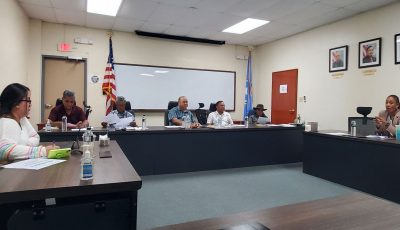Manglona explains go-signal for suit vs IPI, contractors
While the allegations of seven construction workers do paint Imperial Pacific International (CNMI) LLC and its two contractors in a negative light, U.S. District Court for the NMI Chief Judge Ramona V. Manglona ruled that that does not necessarily mean she must remove them as “scandalous or impertinent.”
Manglona said the facts about the 2016 Occupational Safety and Health Administration inspection and prior accidents at IPI’s casino project site in Garapan are relevant to the seven workers’ claims and would not unnecessarily complicate the workers’ lawsuit.
Manglona made the ruling in her order Monday denying the motions filed by IPI, and contractors Gold Mantis Construction Decoration (CNMI) LLC and MCC International, who are being sued by the seven workers over the injuries they suffered during accidents at the casino project worksite.
IPI, Gold Mantis, and MCC filed motions to dismiss the lawsuit, sought more definite statements, and sought to remove certain paragraphs in the suit.
The plaintiffs, who are all Chinese nationals, are suing the three companies for alleged forced labor in violation of the Trafficking Victims Protection Reauthorization Act and CNMI Anti-Trafficking Act, negligence, and liability for employees of subcontractor.
The workers alleged that they were forced to work long hours for below minimum wage under extremely dangerous conditions at the casino worksite.
IPI sought to remove certain paragraphs in the lawsuit, describing them as “impertinent, immaterial, and scandalous.”
These paragraphs come under the heading “Defendants utterly disregarded the safety of the workers” and discussed injuries suffered by other workers and the 2016 OSHA inspection and report.
IPI argued that the court should remove these paragraphs because plaintiffs do not connect or show a nexus between those allegations and their claims and that they are meant only to create prejudice against IPI.
The workers, however, countered that these paragraphs contain allegations that are directly relevant to its claims because defendants’ refusal to grant OSHA access to the worksite shows that they were aware of the illegal workers and sought to conceal them from federal authorities.
The workers also argued that the injuries of other workers and unsafe work conditions support their negligence claim and show reckless indifference.
In her order, Manglona said that, taken together and viewing the facts and circumstances, the plaintiffs appear to have received immigration threats and financial threats.
Manglona said it is alleged that the employers intended for the seven to believe that immigration harm would befall them and the allegations are sufficient to state a claim of serious harm.
On the plaintiffs’ CNMI anti-trafficking claim, Manglona found that plaintiffs have stated a plausible claim under the CNMI statute.
On the negligence claim, IPI argued that this claim is barred by the exclusivity provision of the CNMI Workers Compensation Act.
WCA provides for compensation for disabilities “resulting from an injury or illness arising out of and in the course of employment.”
IPI asserted that because it maintained workers compensation insurance coverage, plaintiffs’ claim, either as IPI employees or employees of its subcontractors, come within the WCA and are barred because plaintiffs did not file a claim within one year of their injuries.
In support of its assertion that it maintained insurance coverage, IPI submitted two exhibits with its motion to dismiss: a declaration from IPI’s human resources vice president Magdalena Attao and a Workers Compensation proposal from an insurance company for IPI, along with a variety of endorsements and email exchanges.
Manglona, however, is not persuaded.
Manglona said although the lawsuit does allege that defendants’ did not purchase workers compensation insurance for plaintiffs, it does not mention any particular insurance document.
Further, the judge said, there is no reference to a declaration from Attao in the complaint. Therefore, Manglona said, she will not consider these two exhibits in deciding the motion to dismiss.
Manglona said because the predicate fact that IPI did have workers compensation insurance coverage for the plaintiffs at the relevant time is not established, IPI’s motion to dismiss the negligence claim fails.
MCC argued that the negligence claim against it fails because plaintiffs were no longer employees of MCC when they were injured, and therefore it would be impossible for plaintiffs to establish causation by MCC.
However, plaintiffs alleged that MCC’s liability for negligence stems from its role as the general contractor for the casino worksite and no employer-employee relationship is necessary to prove MCC owed a duty to workers at the casino worksite.
Manglona agreed that plaintiffs have stated plausible claims against IPI, MCC, and Gold Mantis as the developer, general contractor, and subcontractor employer, respectively, of the casino project.
At this stage in the proceedings, Manglona said, it is plausible that IPI might be a contractor for the construction project.
Manglona said the complaint makes various allegations of IPI’s role that support this plausibility, such as IPI being deeply involved with selecting and supervising contractors on the casino project.
After reviewing the more than 40 pages long complaint, Mangona also ruled that she agrees that the complaint is not “so vague or ambiguous that defendants cannot reasonably prepare a response.”



























